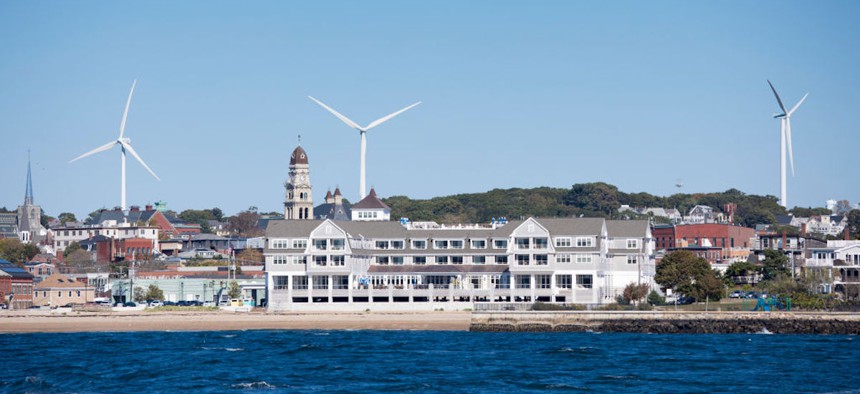Wind power in numbers: Tri-state pact aims to leverage better renewable energy deal

Photo by Tim Graham/Getty Images
A trio of New England states will collaborate in soliciting and reviewing bids for offshore wind projects. The agreement aims to keep clean energy costs down.
This story is republished from Rhode Island Current. Read the original article here.
Think of it like Costco Wholesale, but for wind-powered electricity.
By teaming up with its New England neighbors to buy in bulk, Rhode Island energy leaders say they hope to get a better price on offshore wind.
Long discussed as an idea, the goal is now in writing, inked Tuesday under a first-of-its-kind agreement between energy commissioners of Rhode Island, Massachusetts and Connecticut. The memorandum of understanding between Rhode Island’s Office of Energy Resources, the Massachusetts Department of Energy Resources and Connecticut Department of Energy and Environmental Protection outlines how the three states plan to collaborate in soliciting, and reviewing, bids for offshore wind projects.
The agreement comes days after Rhode Island Energy, the state’s primary utility operator, announced plans to try again on its attempt to buy up to 1,200 megawatts of wind electricity for the state. What was supposed to be a competitive solicitation process first unveiled a year ago ended with a single bid, rejected for being too expensive.
Massachusetts, meanwhile, has already published its own solicitation for up to 3,600 megawatts of wind-powered electricity, while Connecticut is finalizing its draft proposal for just shy of 1,200 megawatts.
By joining forces, the trio of southern New England states are now opening up the prospect of accepting bids for an even larger project: up to 6,000 megawatts, which would be split among the states.
“By working regionally, we hope to secure cost-competitive energy resources that will make our energy supply more reliable, affordable and clean,” Chris Kearns, Rhode Island’s acting energy commissioner, said in a virtual briefing with reporters on Tuesday.
It also might help developers facing skyrocketing costs thanks to interest rate hikes and supply chain snafus, prompting two companies in Massachusetts to pull out of their existing agreements to try and win better deals.
“Developers have always kind of commented that they need a certain amount of megawatts of capacity for their company or the supply chain to invest in New England,” Kearns said.
And, it will help Rhode Island meet its ambitious decarbonization goals, including a first-in-the-nation mandate to have 100% of state electricity needs offset from renewable energy by 2030.
“Offshore wind is an important resource in meeting our Act on Climate and renewable energy goals,” Gov. Dan McKee said in a statement. “Regional collaboration through this three-states MOU will not only help in advancing offshore wind projects of large scale by securing cost-effective energy prices for ratepayers – but it also provides a significant opportunity for long-term economic development that the offshore wind industry will bring to the three states.”
Developers have always kind of commented that they need a certain amount of megawatts of capacity for their company or the supply chain to invest in New England.
– Chris Kearns, Rhode Island’s acting energy commissioner
Proposals that would provide electricity to two or three states will be prioritized, though single-state projects are not off the table. Under the agreement, each state will evaluate the proposals independently of the others, based on their own criteria including cost-benefit analysis and economic development.
Proposals that span multiple states must offer the same price of electricity per kilowatt-hour to each state, unless the project brings extra economic or environmental benefits to one state, which can be factored into that state’s pricing, according to the agreement.
Kearns described the agreement as an “addendum” to the individual state requests for proposals, rather than a tri-state, joint solicitation.
Details of how state regulators and administrators will coordinate their evaluations, and prospective awarding of bids, are still being worked out, but the intent is to have all three states close their solicitations in concert in late January, Kearns said.
Rhode Island’s new solicitation has yet to be published, but will likely be unveiled in mid-October, Kearns said.





